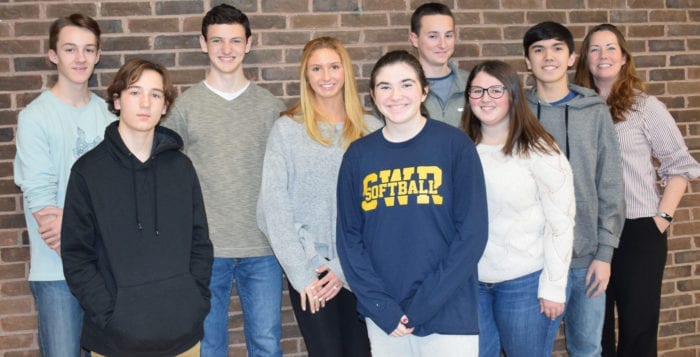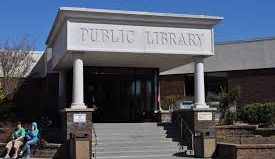First-year SWR debate team competes at states

In a little over a year, the Shoreham-Wading River debate team developed from an idea by two high school students into a fully formed, competing group in the New York State Forensic League championship. And while team members admit they still have a lot to learn following their recent defeat in the state tournament hosted at Hofstra University April 28 and 29, they can’t argue with how far they’ve come.
After success in February’s qualifer, four students from the nine-member team — juniors Mahdi Rashidzada and Andrew Honold, and freshmen Jalal Sawas and Yusra Rashidzada — went up against more experienced debaters from various school districts across Long Island and the state.
“We were all very worried about how the debate would go since we didn’t really know what to expect — after all, it was our first championship debate.”
— Mahdi Rashidzada
With a discussion topic of universal basic income implementation in various countries, Sawas and Yusra Rashidzada won one out of five debates while Honold and Mahdi Rashidzada lost all five of theirs. Every student competed in five rounds on Saturday, and, depending on how well they did, advanced to final rounds on Sunday.
Mahdi Rashidzada said though the team lost, he considers his team’s participation learning experience for the future.
“At first we were all very worried about how the debate would go since we didn’t really know what to expect — after all, it was our first championship debate,” the junior said said, pointing out that the team was assembled at the start of the 2017-18 school year.
In February, the team began preparing for the state competition by meeting after school at each other’s houses two days a week, researching the debate topic, writing speeches and practicing counterarguments in front of adviser and English teacher Brenna Gilroy.
“We really wanted to go in there and win something, but we kind of knew that we shouldn’t expect a win since everyone we went against were amazing debaters [who have been debating since their freshman year],” Rashidzada said. “We hope to improve our rankings by working hard next year.”
He added that he and the rest of the Shoreham students had great camaraderie with other debate teams.
“We became friends with our rivals, so the atmosphere was very enjoyable,” he said.
Honold, who, during the qualifiers at Jericho High School Feb. 10, nabbed first place in the junior division by winning all four of his debates there, also hopes that last month’s competition will have a positive impact on the club moving forward.
“States was sobering for the team. We realized we have a lot of potential going into the future, but we must work over the coming year to have a chance to do better next year.”
— Andrew Honold
“Frankly, we all learned that we have a lot to learn,” he said. “Our performance at states was disappointing, and we expected to do better. We faced a lot of really talented, experienced and disciplined debaters and, for the most part, they outplayed us. Really, states was sobering for the team. We realized we have a lot of potential going into the future, but we must work over the coming year to have a chance to do better next year.”
And by already reaching this high level of competition within its first academic year, the odds are in Shoreham’s favor, especially with all the state qualifiers returning to the team.
In March 2017, two then-sophomores and later club co-captains Declan Beran and Emma Kirkpatrick brought their debate team idea to the board of education. They proposed that such a team, which was unanimously approved, would be beneficial to students with interests in political science or law. They said that by their senior year, they hoped to compete with other schools.
The club’s members, who span all grade levels, have said through debate they learn analytical and public speaking skills, and hone speechwriting and teamwork abilities.
“I learned how to better structure my debate, and overall I feel like I’ve learned how to become a better speaker this year,” Sawas said following the state competition. “I found it crazy that I was going up against the best kids in the state with honestly little experience, [but] I found it fun.”






